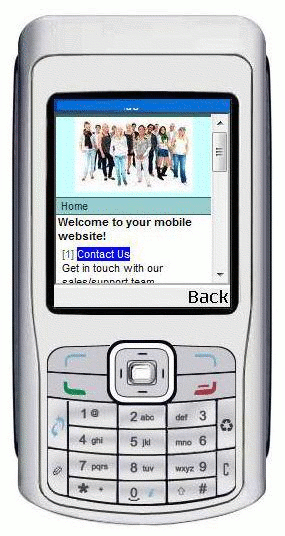You may be wondering why you would even need a mobile site. The simple answer is that mobile internet browsing is expected to actually surpass regular PC internet browsing. It hasn’t happened yet but it is getting real close.
 That means more people be finding who they do business with using their cell phone than their home or work computer.
That means more people be finding who they do business with using their cell phone than their home or work computer.
Google even has a new search engine exclusively for mobile users and if you don’t have a mobile site then you are not being found by your potential customers.
What is a mobile site?
Some business owners ask me if their site is mobile already – they see it when they use their I-phone, “So isn’t it a mobile site?” …We’ll not exactly.
A mobile site is constructed so that when viewed on a small cell phone screen it is easy to use and navigate. Even with an I-phone, Blackberry or Android that can display a website in “normal view”, most websites are designed for a desktop and that means all kinds of scrolling around the phone to see the site.
A good plan for a mobile site is what I call “Light and Tight”..
- Include the most needed information and upfront. Such as your phone number, address, what you have to offer.
- Use few and properly sized graphics. Most phone theses days can display graphics so it’s O.K. to use a few, but they must be optimized.
- The overall page size should be small.
- To load quickly, a large site will be passed over, if not by the search engine by the customer who can wait 10 minutes to find your phone number.
- Many customers pay for data by the bits and bytes – so that long article or huge picture can actually cost them money.
- Include special mobile features like;
- Click to Call
- Map to location
- Email Link
- Keep in mind not everyone has the latest, greatest cell phone, so keep it “Light and Tight”.
There are two basic ways to go about going mobile.
- Add mobile to your existing site.
- Use a whole new domain for your mobile site and link both sites together.
Both option offer advantages and disadvantage and either is much better to not having a mobile site.
More About Mobile Search and Mobile Websites
From the words of Google: On Feb 17, 2010 Google CEO, Eric Schmidt, put mobile at the heart of the Internet giant’s future in a special Mobile World Congress keynote speech where he proclaimed “Mobile First!”
“The basic message is pretty simple. The confluence of these three factors (computing, connectivity, and the cloud) means your phone is your alter ego, an extension of everything we do,” Schmidt concluded.
“Here, right now, we understand the new rule is ‘mobile first’ in everything. Perhaps the phrase should be ‘mobile first’ simply because it’s time to be proud of what we have build together. Our job is to make mobile be the answer to everything.”
Mobile site statistics in a nutshell:
1) Mobile subscribers are growing rapidly. There will be 5.8 billion mobile subscribers worldwide by 2013 (Portio Research). No other media channel offers anything like this reach.
2) Handset figures show strong growth in smartphone sales (Gartner), which will be 29 percent of all cell phones by 2014 (Ovum). This means a richer mobile Web experience for mobile users.
3) 60 percent of the world’s population is now covered by a next-generation High Speed Packet Access mobile network (3G Americas). That means better access to high-speed downloads.
4) Mobile data is expected to balloon: a) revenue-wise, analysts expect data to be bigger than voice by 2011 (Pyramid Research); b) volume-wise, as mobile Internet users will be sending and receiving more data in one month than in the whole of 2008 (ABI Research).
5) No matter how bad the world recession becomes, mobile services revenue e.g. those useful value-added services offered to customers by operators, will continue to increase (ABI Research).
6) As the mobile Web matures, so brand expenditure on mobile advertising is predicted to be bigger than spending on SMS marketing in 2009, then will quadruple by 2014 (Juniper Research).
